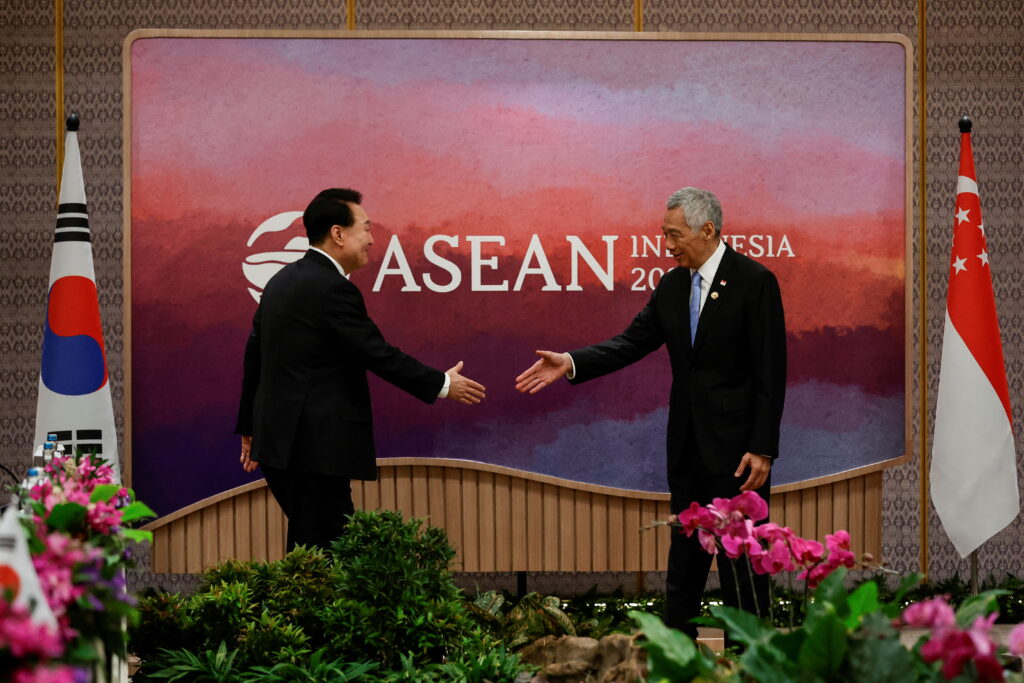Inter-Korean relations have been an extremely challenging issue for South Korea. But when all doors have closed, one remains open — Southeast Asia.
When South Korean President Yoon Suk-yeol took office in May 2022, he was determined to break away from former president Moon Jae-in’s conciliatory approach towards a peace process with North Korea and to revitalise military deterrence against North Korea. Yoon also sought to avoid being tied down by inter-Korean relations in his broader foreign policy — within the Indo-Pacific Strategy, he has expressed his intention to go beyond the Korean peninsula and to transform South Korea into a ‘global pivotal state’. But after the US–Japan–ROK Trilateral Leaders’ Summit at Camp David in August 2023 and the North Korea–Russia Summit in September 2023, President Yoon seems no longer interested in the ‘global pivotal state’ concept.
Yoon has been forced to focus a great deal of his time on dealing with North Korea. The problem has worsened in 2024. North Korean leader Kim Jong-un has slammed the door to peaceful reunification shut, formally removing it as a national goal from the country’s constitution.
President Yoon is seeking to deal with the looming threat of war from North Korea in a way that enables victory for his People Power Party in the upcoming April 2024 general election. The national assembly is currently dominated by the Democratic Party of Korea, which holds 164 out of 300 seats. Yoon is also facing low approval ratings, which reached under 30 per cent for the first time in nine months in February 2024. Yoon thus made the strategic move in December 2023 to reshuffle his cabinet and appoint six new ministers, enabling the replaced ministers to run in the legislative election.
Unlike his predecessor, Yoon is not prioritising resuming talks with North Korea or seeking a breakthrough in inter-Korean relations. What he really aiming at is to prevent war. But relying solely on military deterrence is far from ideal. South Korea should reach out to other parties to help defuse tensions.
Northeast Asia is perhaps not a feasible option for South Korea. China has remained inactive beyond calling on all parties involved to use restraint and dialogue to avoid triggering closer trilateral cooperation between the United States, Japan and South Korea. South Korea also cannot turn to Russia for help, with Russian President Vladimir Putin seeking tighter cooperation with North Korea.
There is one card left on the table for South Korea — Southeast Asia. Southeast Asian countries and ASEAN have played important roles in regional peacebuilding and dialogue facilitation. From a divided region during the Cold War, ASEAN has now brought together all 11 Southeast Asian countries (Timor-Leste will ‘ideally’ become a full member in 2025). ASEAN countries hold more than 200 meetings every year while their Northeast Asian neighbours still struggle to sit down and talk to each other.
In Southeast Asia, there are four candidates that could assume a mediation role. The first is Indonesia, who shows a strong commitment to non-aligned foreign policy and has long been considered ASEAN’s de facto leader. For example, as the host of the 2022 G20 Summit, Indonesia invited Russia to attend despite pressure from the West. Another option is Thailand, who is intensifying its efforts to solve the Myanmar problem and has successfully organised a meeting between US National Security Adviser Jake Sullivan and Chinese Foreign Minister Wang Yi in January 2024, during a time of fierce strategic competition.
Singapore and Vietnam are also strong candidates given their involvement in the denuclearisation process by hosting the US–North Korea summits in 2018 and 2019 respectively. Both countries have established diplomatic relations with North Korea, but Vietnam is the better option for South Korea given Singapore’s closer ties to the United States.
Vietnam and North Korea have maintained good relations over time. And Vietnam is South Korea’s most important market and investment destination in Southeast Asia and the coordinator for ASEAN–South Korea relations from 2021–24.
South Korea’s task is apparent — to turn to Southeast Asia. No matter what choice Seoul makes, it should foster discussions about maintaining regional peace and stability with key ASEAN players within ASEAN-led mechanisms to strengthen strategic trust between South Korea and ASEAN countries. Southeast Asia can be a trusted mediator, if both Koreas underline the importance of resuming dialogue.
Le Nhu Mai is Research Fellow at the Institute for Foreign Policy and Strategic Studies, Diplomatic Academy of Vietnam.

